Popular in your industry
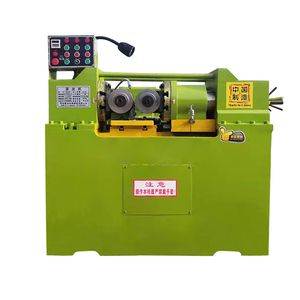



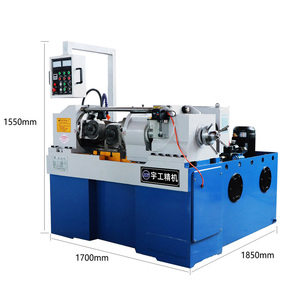

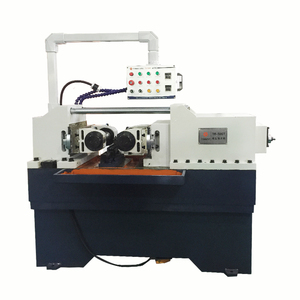



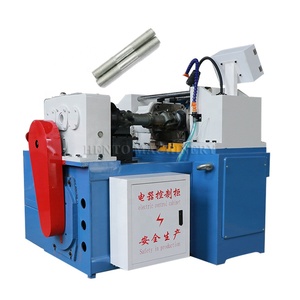

Related Searches:

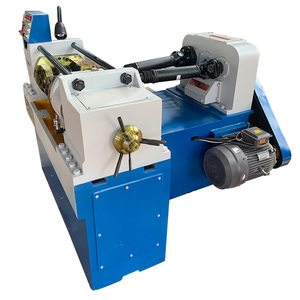



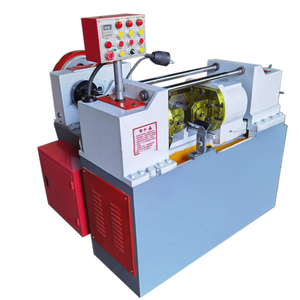



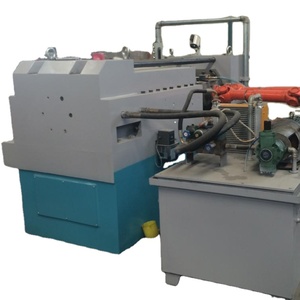

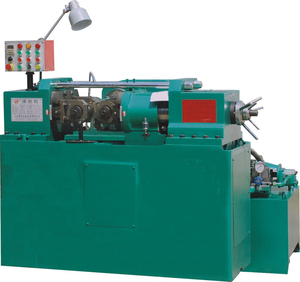
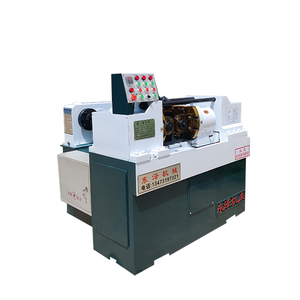

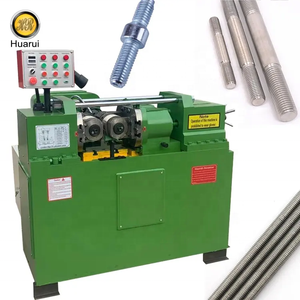









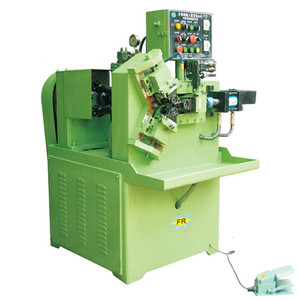
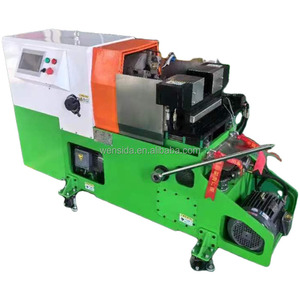
Top categories
About hydraulic thread rolling machine
Types of hydraulic thread rolling machines
A hydraulic thread rolling machine is a piece of equipment used to create threads on a rod or fastener. It generally falls into three main types based on the threading process they perform: in-feed, through-feed, and plunge. These machines are vital in industries that need to create threads on pieces of metal, such as fasteners, bolts, and screws.
- In-feed threading machines: These are thread rolling machines where the workpiece is inserted between the dies and rolls to create threads. This is usually done manually or by using a pneumatic system. Once the workpiece is inserted and the dies are closed, the dies start rotating and the workpiece starts feeding into the machine. The dies keep rotating, and the workpiece keeps moving through the machine until the entire length of the workpiece is threaded.
- Through-feed machines: These machines are similar to in-feed machines, but the workpiece is threaded through the dies to create long screws, studs, and bolts. The workpiece is fed into the machine through a guide or a conveyor system until the entire workpiece is threaded. The threaded workpiece is then collected in a bin or container. Through-feed machines are suitable for high-volume production.
- Plunge thread rolling machines: These machines are used for creating threads in the root of a blank. The blank is placed between the dies, and the dies are pressed into the workpiece using pressure. Plunge thread rolling machines are not as commonly used as in-feed and through-feed machines, but they are used for creating threads in specific applications.
Specification and maintenance of hydraulic thread rolling machines
Specifications of hydraulic thread rolling machines vary based on different models and manufacturers. The following are some common specifications.
- Roll Diameter and Width
Hydraulic thread rolling machines have different roll diameters and widths. The roll diameter range is from 54 to 120 mm, while the roll width range is from 15 to 100 mm. The threads are rolled between the two rollers, and the right-sized rollers are needed to achieve the right thread size.
- Rolling Speed
The rolling speed varies depending on the hydraulic thread rolling machine's model and the thread's diameter. Generally, the rolling speed range is from 5 to 15 r/min.
- Rolling Capacity
The rolling capacity of a hydraulic thread rolling machine is determined by the maximum diameter and maximum pitch of the threads. The maximum diameter range is from M10 to M80, and the maximum pitch range is from 1.25 to 8 mm.
- Motor Power
The motor power is the amount of power the hydraulic thread rolling machine uses to carry out the threading process. The motor power is usually between 3 and 15 kW, depending on the machine's size and capacity.
- Overall Dimensions and Weight
The hydraulic thread rolling machine has different overall dimensions and weight. The machine's length, width, and height range from 900 x 800 x 1300 to 1900 x 1600 x 2200 mm, and the weight ranges from 800 to 5000 kg.
Maintenance of hydraulic thread rolling machines is crucial for their performance and longevity. Here are some maintenance tips:
- Regular Inspection
Inspect the machine for any signs of wear, damage, or loose components. Check the hydraulic system, electrical components, and safety devices to ensure they are functioning properly.
- Lubrication
Proper lubrication is essential to reduce friction and wear between moving parts. Refer to the manufacturer's recommendations and lubricate all the machine's parts.
- Cleaning
Keep the machine clean by removing any debris or swarf after each use. Periodically clean the machine's surfaces and the threading rollers to prevent buildup.
- Safety Precautions
Follow all safety guidelines when operating the machine. Ensure that the operators are trained on how to use the hydraulic thread rolling machine properly. Use the appropriate safety equipment to avoid accidents and injuries.
Scenarios of hydraulic thread rolling machines
Hydraulic thread rolling machines are crucial in many industries that deal with manufacturing and production. Here are some areas where the hydraulic thread rolling machine is commonly used.
- Automotive Industry
In the automotive industry, hydraulic thread rolling machines are used to create precise and strong threads on various car components. These components include engine parts, suspension systems, and wheel hubs. Threaded connections that are created through hydraulic thread rolling in the automotive sector are durable and reliable. They can withstand constant vibrations, high torque, and pressure.
- Construction Industry
In the construction industry, hydraulic thread rolling machines are used to create threaded rods, bolts, and anchor bolts. These fasteners are used to join together different construction materials. The machine can create threads on long rods, allowing them to be customized to fit specific construction needs. The threads created through hydraulic thread rolling process are strong and precise, ensuring that the joints created are secure and stable.
- Aerospace Industry
In the aerospace industry, hydraulic thread rolling machines are used to create threads on various aircraft components. The machine creates threads that meet very tight tolerances required for the industry. The threads produced are strong, precise, and reliable. They can withstand extreme pressure and temperature conditions.
- Energy Industry
In the energy industry, hydraulic thread rolling machines are used to create threads on pipelines, valves, and other energy components. The machine produces threads that can withstand high pressure and harsh environmental conditions. They provide secure joints for energy transmission and distribution systems.
How to choose hydraulic thread rolling machines
When selecting a hydraulic thread rolling machine, there are several factors to consider to ensure that the chosen machine meets the specific production needs and requirements.
- Production volume
When selecting the right hydraulic thread rolling machine for a particular application, the first thing to consider is the production volume. This is because different types of machines are designed to meet the needs of different production volumes. For high production volumes, it is preferable to choose automated or heavy-duty machines with fast rolling speeds. On the other hand, for lower production volumes, manual or smaller models may be more suitable.
- Thread size and specification
Hydraulic thread rolling machines differ in their ability to handle various thread sizes and specifications. It is important to ensure that the machine selected can accommodate the required thread sizes, pitches, and profiles. Some machines may require additional tools or accessories for specific thread types, so it is important to clarify this before purchasing.
- Material Compatibility
Hydraulic thread rolling machines are designed to work with different types of materials, including metals and alloys. It is important to ensure that the selected machine is compatible with the specific material being used. This includes considering the material's hardness, strength, and other properties that may affect the rolling process. Additionally, it is important to ensure that the machine's roll dies are appropriate for the material being used to achieve the desired thread quality.
- Operational requirements
It is important to consider the operational requirements of the application to ensure that the selected machine can meet them. This includes factors such as the available floor space, power supply, and any specific environmental or safety considerations. In addition, it is important to consider the machine's control system and any required training or expertise to operate it effectively.
- Cost and ROI
When choosing a hydraulic thread rolling machine, it is important to consider the cost and return on investment. While it is important to choose a machine that meets production needs, it is also important to consider long-term productivity and profitability. This includes considering factors such as machine quality, maintenance requirements, and potential savings in production costs over time.
Hydraulic thread rolling machine Q & A
Q1 What is the difference between a hydraulic and a pneumatic thread rolling machine?
A1 The main difference between a hydraulic thread rolling machine and a pneumatic thread rolling machine is the power source. Pneumatic machines are powered by compressed air, while hydraulic machines use fluid pressure. Both machines perform the same function, but hydraulic machines are usually more powerful and can handle higher workloads.
Q2 What is the approximate service life of a thread rolling machine?
A2 The service life of a thread rolling machine can vary depending on usage, maintenance, and other factors. However, machines used in a production setting operating one shift per day should last a minimum of 10 - 15 years when properly maintained.
Q3 What are the maintenance requirements of a thread rolling machine?
A3 Regular maintenance is critical to ensuring the longevity and performance of a thread rolling machine. Routine maintenance tasks include:
- Cleaning the machine regularly to remove debris and contaminants.
- Applying lubrication to moving parts to reduce friction and wear.
- Periodically inspecting the machine for signs of damage or wear and addressing any issues promptly.
- Training staff on proper operation techniques to avoid misuse or unnecessary strain on the machine.
Q4 What safety precautions are important when operating a thread rolling machine?
A4 Thread rolling machines are powerful pieces of equipment that can pose serious risks to operators. It's important to follow proper safety precautions at all times. Some important safety tips include:
- Always wear appropriate personal protective equipment, such as safety glasses and gloves.
- Never attempt to thread roll material that exceeds the machine's capacity.
- Avoid reaching into the machine while it's in operation and always shut off the power before performing maintenance.
- Operate the machine in a well-ventilated area to avoid inhalation of fumes and particles.
























